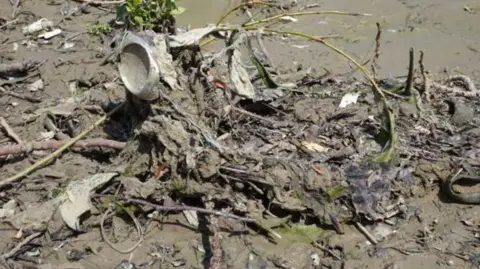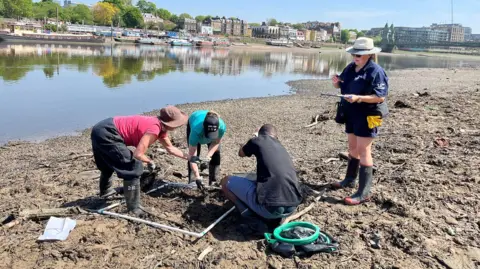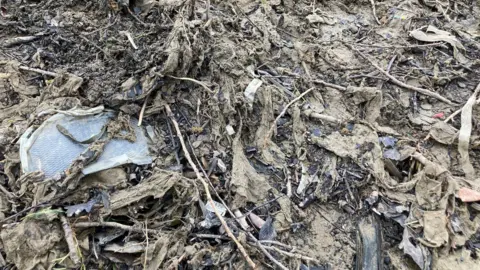'When will government ban plastic in wet wipes?'
 Thames21
Thames21A charity has called for the government to commit to a date when plastic will be banned in wet wipes, to help prevent the effect they are having on the River Thames.
Thames21 says wet wipes are not only creating artificial islands, harming wildlife and impacting water quality; they are reshaping the waterway itself.
The charity said although plans were announced last year to ban the sale of plastic wet wipes, progress had halted following the general election.
A spokesperson for the Department for Environment, Food and Rural Affairs (Defra) said: "Plastic wet wipes clog up our sewers, pollute our waterways and harm our treasured wildlife. That is why the government will ban them."

Liz Gyekye from Thames21 said: "Wet wipes are a massive problem, it's devastating.
"The principal challenge is that people flush the wet wipes down the toilets, then you get sewage overflows after heavy rain that chuck them into the river.
"They then destroy wildlife because it ingests these microplastics when they break down."
Ms Gyekye said the charity wanted the government to act "urgently".
"We had the previous Conservative government last year commit to banning plastic in wet wipes, and now we're calling on this government to implement this ban," she said.
Asked why the public were still flushing wet wipes despite the obvious damage being caused, Ms Gyekye said: "I think the issue is over labels - some labels say they are 'flushable' - but there is no marine biodegradable standard out there - so they should all just go in the bin."
She added: "Consumers need to do their part and dispose of their waste correctly, flushing down only the 3 Ps (pee, poo, and paper)."

The director of sustainability at the Port of London Authority (PLA), Grace Rawnsley, said the new Thames super sewer "should help" cope with flushed wet wipes, but said the ban on plastic in wet wipes was "key" to achieving a cleaner river.
Volunteer Janice Bruce-Brande said that although the wet wipe island she was surveying was "soul destroying", she had noticed a possible improvement since the introduction of the super sewer.
But she said it was still "so disheartening" to see the wet wipe problem.
'We will ban them'
In response to Thames21's calls, a Defra spokesperson told the BBC: "Plastic wet wipes clog up our sewers, pollute our waterways and harm our treasured wildlife.
"That is why the government will ban them.
"This is part of our wider plan to clean up our rivers. We have passed our landmark Water Act, introducing two-year prison sentences for polluting water bosses, and banning unfair million-pound bonuses."
Listen to the best of BBC Radio London on Sounds and follow BBC London on Facebook, X and Instagram. Send your story ideas to [email protected]
